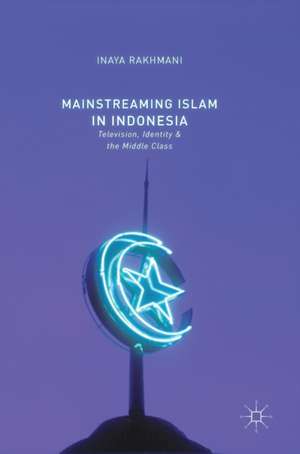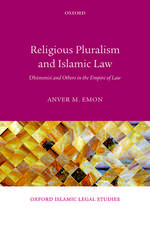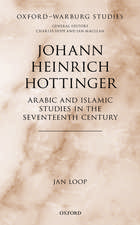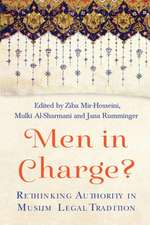Mainstreaming Islam in Indonesia: Television, Identity, and the Middle Class
Autor Inaya Rakhmanien Limba Engleză Hardback – 17 ian 2017
| Toate formatele și edițiile | Preț | Express |
|---|---|---|
| Paperback (1) | 435.54 lei 6-8 săpt. | |
| Palgrave Macmillan US – 14 iul 2018 | 435.54 lei 6-8 săpt. | |
| Hardback (1) | 441.70 lei 6-8 săpt. | |
| Palgrave Macmillan US – 17 ian 2017 | 441.70 lei 6-8 săpt. |
Preț: 441.70 lei
Nou
Puncte Express: 663
Preț estimativ în valută:
84.52€ • 90.38$ • 70.47£
84.52€ • 90.38$ • 70.47£
Carte tipărită la comandă
Livrare economică 18 aprilie-02 mai
Preluare comenzi: 021 569.72.76
Specificații
ISBN-13: 9781137557209
ISBN-10: 1137557206
Pagini: 214
Ilustrații: XI, 216 p.
Dimensiuni: 148 x 210 x 14 mm
Greutate: 0.43 kg
Ediția:1st ed. 2016
Editura: Palgrave Macmillan US
Colecția Palgrave Macmillan
Locul publicării:New York, United States
ISBN-10: 1137557206
Pagini: 214
Ilustrații: XI, 216 p.
Dimensiuni: 148 x 210 x 14 mm
Greutate: 0.43 kg
Ediția:1st ed. 2016
Editura: Palgrave Macmillan US
Colecția Palgrave Macmillan
Locul publicării:New York, United States
Cuprins
The Emergence of a Muslim Middle Class in Liberalising Indonesia.- Television and the Da’wah Supermarket.- Commercial Da’wah.- Anxieties of the Muslim Middle Class.- Market-compatible Developmentalism.- Local Subjugations.- Conclusion.
Recenzii
“This study provides a much-needed, original perspective on Islamism by analysing how aspects of Indonesia’s majority religion have been channelled and disseminated to audiences by the country’s most popular mass medium, television. … this book is landmark study in the emerging field of Asian cultural studies. … I highly recommend her book to scholars and students with an interest in media, cultural, sociological and religious studies.” (Edwin Jurriëns, newbooks.asia, February, 2018)
Notă biografică
Dr. Inaya Rakhmani is the Director of the Communication Research Centre, Faculty of Social and Political Sciences, Universitas Indonesia and an associate at the Asia Research Centre, Murdoch University, Australia. Dr. Rakhmani has a particular interest in the cultural political economy of knowledge, information, and entertainment as well as the role of media in processes of democratisation.
Textul de pe ultima copertă
This cutting edge book considers the question of Islam and commercialisation in Indonesia, a majority Muslim, non-Arab country. Revealing the cultural heterogeneity behind rising Islamism in a democratizing society, it highlights the case of television production and the identity of its viewers. Drawing from detailed case studies from across islands in the diverse archipelagic country, it contends that commercial television has democratised the relationship between Islamic authority and the Muslim congregation, and investigates the responses of the heterogeneous middle class towards commercial da’wah. By taking the case of commercial television, the book argues that what is occurring in Indonesia is less related to Islamic ideologisation than it is a symbiosis between Muslim middle class anxieties and the workings of market forces. It examines the web of relationships that links Islamic expression, commercial television, and national imagination, arguing that the commercialisation of Islam through national television discloses unrequited expectations of equality between ethnic and religious groups as well as between regions.
Caracteristici
Addresses the question of Islam and commercialisation in Indonesia through the lens of commercial television. Considers how commercial television has democratised the relationship between Islamic authority and the Muslim congregation. Examines the web of relationships between Islamic expression, commercial media and and national imagination.














